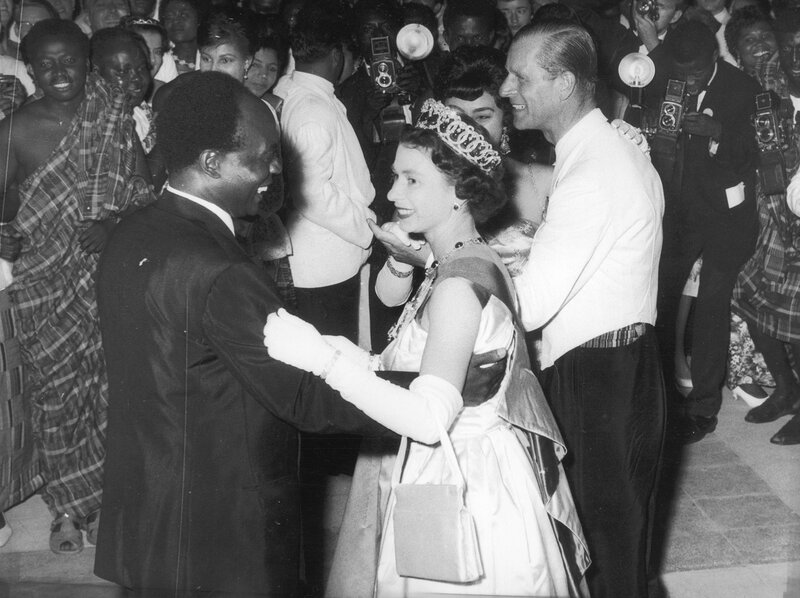On November 10, 1961, Queen Elizabeth II then aged 35 visited Ghana in a visit delayed by two years because she had taken seed and had to put to bed before embarking on the travel.
Ghana under Prime Minister Kwame Nkrumah had gained independence from Britain in March, 1957 but the British were keen to have Nkrumah as an ally in the Commonwealth rather than risk him turning to the Soviets.
Elizabeth II spent 11 days touring the country having landed on November 9. She departed on November 20 having attended a durbar to welcome her as well as take a dance with President Nkrumah in a bid to foster a new standing as partners between the crown and former colony.

Central Press/Getty Images
The Kumasi Sports Stadium also served as venue to display Asante’s rich culture when chiefs in the region assembled to welcome the queen. Posters of Queen Elizabeth II and President Kwame Nkrumah also decorated Accra’s roadside.
The trip was, however, nearly in jeopardy of not happening. A mere five days before Elizabeth’s trip was to begin, bombs went off in the capital city of Accra with Nkrumah’s statue getting damaged. The fear was that the opposition in wanting to eliminate Nkrumah might use the queen as collateral damage to achieve their objective.
The thought of harm coming to Queen Elizabeth II was so severe that, members of Parliament and the British public didn’t want her to go. Winston Churchill expressed similar fears to Prime Minister Harold Macmillan.
However, the Queen forged ahead with plans for her Ghana visit stressing she had cancelled one trip already owing to becoming pregnant with Prince Andrew in 1959 and was keen to avoid any insult or embarrassing Ghana by postponing the visit, which could push Nkrumah into leaving the Commonwealth altogether.
Another consideration on the queen’s mind was Nkrumah’s open policy of not looking neither west nor east but forward allowing him to deal with any country which gave Ghana the best terms.

Photo: Paul Schutzer/The LIFE Picture Collection/Getty Images)
The Ghanaian leader’s visit to Moscow that October was a source of concern to Britain, fearing the Soviet Union was expanding its foothold in Africa amidst the Cold War using Ghana.
“How silly I should look if I was scared to visit Ghana and then [Soviet leader Nikita] Khrushchev went and had a good reception,” Elizabeth told her prime minister, adding, “I am not a film star. I am the head of the Commonwealth — and I am paid to face any risks that may be involved. Nor do I say this lightly. Do not forget that I have three children.”
At a state dinner for Elizabeth and Prince Philip, Nkrumah toasted Elizabeth explaining, despite the challenges, “….The personal regard and affection which we have or Your Majesty will remain unaffected,” while the queen made it known that although disagreements may arise, it shouldn’t lead to departing the Commonwealth. Her visit indeed ceased talks about Ghana wanting to leave the Commonwealth.

An account holds that beyond the flowery scenes and nice words, Elizabeth’s journey helped Ghana secure founding for the Volta Dam from the Americans.
Upon her safe return to Britain, Prime Minister Macmillan is said to have contacted President John F. Kennedy saying, “I have risked my Queen. You must risk your money.” Financial backing indeed came from the American company, Volta Aluminum Company (Valco) for the Volta River hydropower project also known as the Akosombo Dam which was till recently the chief source of domestic and commercial electricity for Ghanaians.











